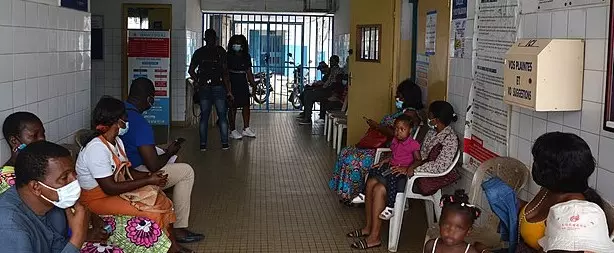
This is the second time in two years that WHO has declared mpox (also known as monkeypox) a global health emergency. Representative image: Wikimedia Commons
WHO declares Mpox a global health emergency; 13 nations in Africa affected
Mpox (monkeypox) spreads mostly through close contact with infected people, including through sex. It is usually mild, but the death rate of the new form is about 3-4 per cent

The World Health Organisation (WHO) on Wednesday (August 14) declared mpox a global health emergency after an outbreak of the viral infection in the Democratic Republic of Congo and in other countries in Africa.
This is the second time in two years that WHO has declared mpox (also known as monkeypox) a global health emergency.
Spreads by close contact with infected people
Mpox spreads mostly through close contact with infected people, including through sex. It causes pus-filled lesions on the chest, hands, and feet, and the new form of the infection causes lesions also on the genitals. It also causes flu-like symptoms. The disease is usually mild, but the death rate of the new form is about 3-4 per cent.
The death rate was less than 1 per cent during the previous mpox outbreak in 2022. A different form of the virus spread mostly through sexual contact between men.
By declaring a disease outbreak as a “public health emergency of international concern” (PHEIC – WHO’S highest level of alert), the global health body hopes to increase the level of funding, research, and global public health measures to contain the spread of the disease.
“It’s clear that a coordinated international response is essential to stop these outbreaks and save lives,” said Tedros Ghebreyesus, Director General of WHO.
Africa CDC appeals for international help
Earlier this week, the Africa Centers for Disease Control and Prevention declared the mpox outbreaks a public health emergency and appealed for international help to stop the infection from spreading.
There have been more than 17,000 suspected mpox cases and over 500 deaths reported in Africa this year, according to the Africa CDC. It said the cases have been reported in 13 countries this year, and more than 96 per cent of cases and deaths have been in Congo.
Majority of infected are children
The officials said that almost 70 per cent of the cases are in children younger than 15, and they accounted for 85 per cent of the fatalities.
“It’s a failure of the global community that things had to get this bad to release the resources needed,” said Michael Marks, a professor of medicine at the London School of Hygiene and Tropical Medicine.
An epidemiologist working with international charities in Congo said he and other experts were especially worried about the spread of mpox in refugee camps in Congo’s conflict-ridden east.
The organisation Save the Children said that Congo’s health system was already collapsing under the strain of measles, cholera, and malnutrition.
“This is something that should concern us all. The potential for further spread beyond Africa is very worrying,” said Ghebreyesus.
Need for vaccines and treatments
In 2022, western countries prevented the spread of mpox with the help of vaccines and treatments. However, very few of these have been available in Africa.
Congolese authorities said they have asked for 4 million doses of mpox vaccine, mostly for children under 18. They said Japan and USA are two countries that have agreed to give vaccines to their nation.
“The world has a real opportunity here to act in a decisive manner and not repeat past mistakes, but that will take more than an (emergency) declaration, said Dr Boghuma Titanji, an infectious diseases expert at Emory University.

